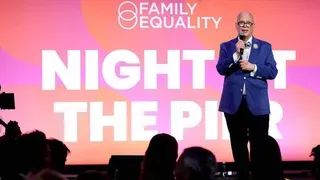June 13, 2009
HIV Infections Continue to Plague Porn Industry
Steve Weinstein READ TIME: 2 MIN.
The porn industry, which has long battled an image of promoting unsafe sex, faces new challenges. Los Angeles health officials have revealed that 22 actors have contracted HIV since 2004.
The controversy erupted on Thursday, when The Los Angeles Times reported that an actress tested positive for HIV infection. The Adult Industry Medical Healthcare Foundation countered that no official report had been made to L.A. County health officials.
But the infection was widely reported on adult-industry websites, which is where the Times first learned of the case. After its initial report, the AIMHF reluctantly confirmed it to a Times reporter. The AIMHF was set up by the porn industry, which is based in Los Angeles, in 2004, after a widely reported incident in which an actor who had been working in Brazil apparently came back infected and went on to give the virus to three actresses here.
AIMHF was meant to stave off harsher restrictions from public officials. But those officials say the self-policing organization doesn't have enough teeth to ensure safety among porn performers.
While barebacking is extremely controversial in the gay-porn world, condomless sex is more or less taken for granted in straight porn. There's a perception that if performers are regularly tested, there's less worry about infection than among gay men.
Now, there will probably be more pressure to use condoms. A safety engineer with California's Occupational Safety and Health Division told the Times that her bureau has tried repeatedly to set standards by issuing citations--including against a gay-porn production company that touted barebacking.
Dr. John Fielding, who heads health concerns for Los Angeles County, pointed out that someone infected with HIV has at least 11 days before the virus becomes virulent to show up on a test. "Let's say you were infected on Monday, tested on Wednesday and perform on Friday. You would show up as negative, but you're not negative," Fielding said.
Dean Fryer, a spokesman for the California Division of Occupational Safety and Health, The New York Times that AIMHF "is not cooperative with us. We don't even know who the employer is in the most recent case; we don't know who the talent is," Fryer said. "They don't provide that to us."
Steve Weinstein has been a regular correspondent for the International Herald Tribune, the Advocate, the Village Voice and Out. He has been covering the AIDS crisis since the early '80s, when he began his career. He is the author of "The Q Guide to Fire Island" (Alyson, 2007).







